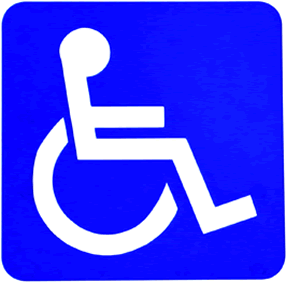The importance of information and communication
technologies (ICT) in the life of European citizens keeps growing,
particularly for all those people who do not have immediate access to
them, persons with disabilities being first.
As a matter of fact, ICTs
are a development factor in accessing work and information, in social
participation, but also in taking advantage of services relating to
education, health, government, electronic commerce and communication.
In the actual stagnation phase or even economic recession, it is
expected that ICTs will provide a boost for productivity and market, which
are the main purposes of the Lisbon strategy which has difficulty getting
forward.
What is known as e-Inclusion, the instrument to implement a
fully inclusive, equal and developed information society, is an essential
element for such a strategy aimed at economic and social progress through
the initiative "2010 - A European Information Society for Growth and
Employment" promoted by the European Commission in 2006. E-Inclusion can
be defined as the driving force of the initiative requiring the
involvement of European institutions, of state members, of the industry
and organizations of users and consumers which collaborate to implement a
shared and effective strategy.
At the end of the ministerial conference
on e-Inclusion in Riga (Lettonia) in 2006, ministers have approved what is
known as the Riga Ministerial Declaration "ICT for an inclusive
information society", whose targets include halving the gap in Internet
usage, and putting in place actions in the field of digital literacy and
accessibility to ICTs by 2010.
However, reaching the objectives of the
Riga Declaration has turned out to be rather arduous and the digital gap
that is risking to make fruitless the project of social cohesion and
economic prosperity seems today more tangible than yesterday. To make up
for this negative situation, it is necessary to have a greater commitment
from all, so that technologies be truly more accessible and economically
affordable, user skills enhanced and ICT services delivered for
effectiveness and accessibility to all.
The European Commission has
published in November 2007 the Communication COM(2007)694 European 2010
Initiative on e-Inclusion "To be part of the information society" which
aims to reintroduce the strengthening process of appropriation and skills
development relating to ICT by users.
Proposed initiatives for 2008 are
an awareness campaign "e-Inclusion, be part of it" which will generate
various activities and end with a ministerial conference to share progress
and enhance commitments, and serve as well as a strategic plan of action
to get ahead with the realization of the Riga Declaration's objectives: to
guarantee conditions so that everyone can access the information society,
significantly reduce disparities in access across the EU, increase the
availability of broadband (coverage) in under-served locations, tackle the
gaps relating to skills development, accelerate the effective
participation of groups at risk of exclusion, integrate actions in favour
of e-Inclusion to maximize long-term impacts. These objectives will not be
easily reached at the European level as a whole since there are prominent
differences in the use of ICTs which in some cases are even getting more
pronounced. This concerns the objective of the use of Internet, where it
does not seem possible to close the gap between average EU population and
older adults, women, people with a lower level of instruction, unemployed
persons and regions with a slower development. It also concerns the
objective of closing the digital literacy gap among the average EU
population and some groups at risk of exclusion, where there remain
considerable gaps for persons over 65 years old, those who are inactive on
the work market and those who have a lower level of instruction; and the
objective on accessibility of public websites of which only a small
portion is accessible to persons with disabilities by respecting the
WAICAG guidelines. ICTs allowed many people to realize significant
progress, but the accessible ICT offer is still insufficient, there still
are gaps in terms of digital skills and some categories of users do not
succeed in keeping pace with evolution. If still 50% of the EU population
does not use the Internet regularly, we should not be surprised that the
level of exclusion is still high and the voice of users still weak. The
ICT sector is also a provider of services that, without the solution to
the problems indicated above, cannot be used by users who are
disadvantaged.
To reach the 2010 and Riga's objectives on e-Inclusion, it is necessary to realize that this is a pressing issue, to strengthen the visibility of the advantages of e-Inclusion, and to consolidate strategic choices.
"e-Inclusion, be part of it" is meant to create awareness and coordinate the contributions aimed at mobilizing participation about a proposal. On the occasion of the high-level ministerial conference planned for the end of 2008, the progress of programmes will be discussed.
In reality, for numerous persons with disabilities obstacles to e-Accessibility are still insurmountable. Communication COM(205)425 on e-Accessibility planned various measures to facilitate the attainment of accessibility to goods and services in the sector, among which the issuing of a new specific set of rules. Everyone involved agree that progress is insufficient and that the impact of adopted measures by some countries seems limited. It is consequently necessary to immediately establish community rules and procedures, before diverging national interventions produce an ulterior fragmentation of the market, and in useful time to influence the development of new mass technologies such as digital television.
During the period 2008-2010, solutions have to be implemented in regards to the independence of persons with disabilities so that they can use digital television and electronic communications to guarantee access to emergency services and the interoperability in accordance with the revision proposed in the directives relative to electronic communications. Organizations and users have to keep up their cooperation with the European institutions of normalization, particularly in regards to the normalization of public contracting of accessible products and services in order to establish in 2008 a European training program on ICT planning accessible to all.
The European Commission will have to implement a transversal legislative approach for an open-minded information society, respectful of rights, and an efficient internal market. Besides guaranteeing the existence of basic conditions, it is necessary to provide incentives for the effective use of services based on ICT and offer the possibility to acquire ulterior competence through education and training services.
In conclusion, it seems appropriate to underline the importance of year 2008 for the success of Initiative 2010 and for the realization of the Riga Declaration objectives. Unfortunately, there is, besides the real problems, obstinate and unjustified resistance on the part of the industry to take on precise commitments, which may create a delay in reaching the objectives beyond the deadline of the mandate of the Commission and the European Parliament in 2009. If this hypothesis were to be true, the damage would be great and the recovery highly difficult. It is better then not to lose today this favourable opportunity.



